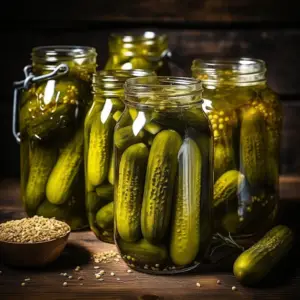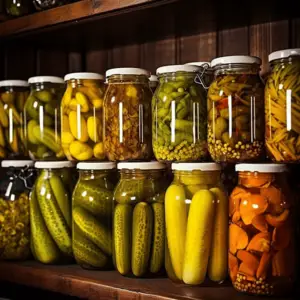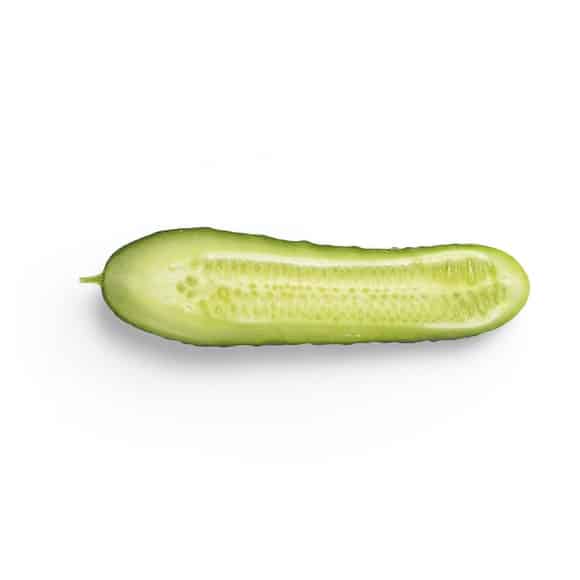Pickle juice storage, The simple answer to this question is no. Pickle juice does not need to be refrigerated but most people find that the drink tastes much better chilled than at room temperature.
Strictly speaking, however, pickle juice refers to the storebought, packaged and approved recipe that is marketed as pure pickle juice.
This drink is a vinegar-based organic drink mixed with triple distilled water, fortified with certain essential vitamins such as vitamin C and E as well as micronutrient minerals such as potassium and calcium. This recipe has been through rigorous testing and is approved by the USFDA (United States Food and Drug Administration).
The standardized manufacturing process means that its pH levels are steady making it stable even without refrigeration.
What many call pickle juice, however, is not necessarily the drink described above only. The liquid in which pickles are soaked is to most people, pickle juice.
Table of Contents
Does pickle juice need to be refrigerated?

While this name is largely acceptable, the liquid in which pickles are soaked is pickle brine and this pickling brine or pickle juice if you must, does not need refrigeration except under specific circumstances.
When to refrigerate your pickle brine
When the seal is broken
Pickle brine remains safe and stable at room temperature as long as it is still sealed. Once unsealed, you are unlikely to be aware at what point precisely you will need to refrigerate. Since Pickle juice storage will still remain stable at room temperature, but exposure to microbials and oxygen could be interfering with this balance.
Taste and smell are not reliable ways of determining whether your pickle brine is still good since pickle brine can last quite a long time without changing significantly in chemical composition making it very difficult to determine at what point your pickle juice is no longer safe for drinking. Just to be on the safe side, refrigerate pickle juice that has been unsealed.
If you drink pickle juice from the bottle
They have taken a swig of your pickle juice directly from the bottle, then you may have inadvertently introduced bacteria into the brine which will begin to chemically react with the brine changing its chemical composition and potentially making it go bad.
Pickle juice storage have a tendency to drink your pickle brine directly from the bottle, it would be advisable to make a habit of refrigerating the rest to mitigate any bacterial growth.
If you would like to reuse the juice
Once you have indulged in your pickles, but you find the juice too harsh or repulsive to drink, you should definitely refrigerate it for preservation and use it for other purposes. Pickle brine is surprisingly versatile and has many other possible uses.
There is however a caveat here. Sometimes the juice is reused to pickle more vegetables which is actually ill-advised.
Pickle brine should never be reused for this purpose because it cannot achieve the same level of fermentation as it did with the first batch that was fermented in it. This means the new batch may not ferment as it should.
In the same way, good and useful bacteria can develop during the fermentation process, failure to achieve the right acidity levels means dangerous bacteria could develop instead causing food poisoning at best or contracting a more serious condition such as botulism which is caused by a bacteria that can develop in highly acidic liquids such as pickle brine.
Without the correct knowledge about the fermenting process, the attempt to reuse pickle juice or pickle brine to ferment fresh vegetables could result in the development of perfect conditions for the growth of Clostridium botulinum, the bacteria that causes botulism.
Other uses for pickle brine include;
- Boiling potatoes
- Tenderizing or marinating meat
- Make pickle popsicles
- An alternative to vinegar
- To bake bread. It creates an excellent sourness to the taste and smell of baked goods.
- As a mixer for alcoholic drinks
- Blend it with fruits for a tastier smoothie
If it is a homemade pickle brine

Home-made pickle brine which is usually a mixture of white vinegar salt and water should absolutely be refrigerated to keep the balance as stable as possible.
In some instances and in different cultures, other herbs may be part of the mixture making homemade pickle brine quite unstable and likely the compound mixture continues to react and churn out chemical compound after another the longer the brine stays at room temperature exposed to air.
In fact, fermentation involves deprivation of oxygen which means the longer this homemade mixture comes into contact with air the more the mixture deviates from standard fermentation practice.
Most people who have been making homemade pickle brine have a wealth of knowledge about the process and the prime conditions for its storage but if you do not fall in this category then you could very well be concocting a poison.
Pickle juice storage must make homemade pickle brine then be sure to refrigerate it to keep its pH levels as stable as possible. Be keen to note if and when the consistency, appearance, smell, or taste of your brine has changed, and discard the mixture.
Make a fresh batch regularly as opposed to making a huge amount that you get to use for long periods of time.
Finally
Pickling is an aged practice dating back over four thousand years ago so it is a tried and tested method of food preservation as well as a way of making vegetables tastier and introducing probiotic organisms into the body.
Today it is not necessary to preserve vegetables this way but without question, pickling is one of the best ways to flavor vegetables other than cooking them.
Short of consuming most vegetables raw, pickling vegetables produces a nutritionally superior product.
In any event, the consumption of raw vegetables has been criticized as a means to retrieve nutrients from vegetables since most vegetables contain high amounts of cellulose which humans cannot effectively break down to access the nutrients in vegetables, making those nutrients present in the raw diet but largely bio-unavailable.
Fermentation breaks down this cellulose making the nutritional value of vegetables available during the digestion process.


